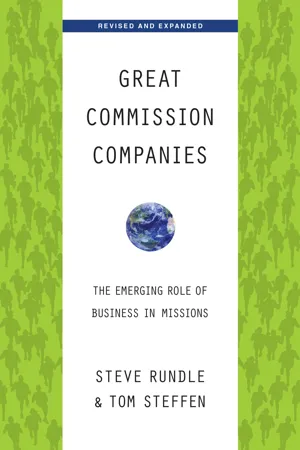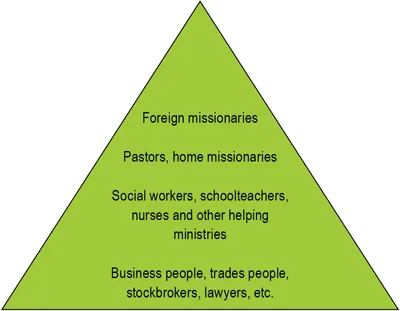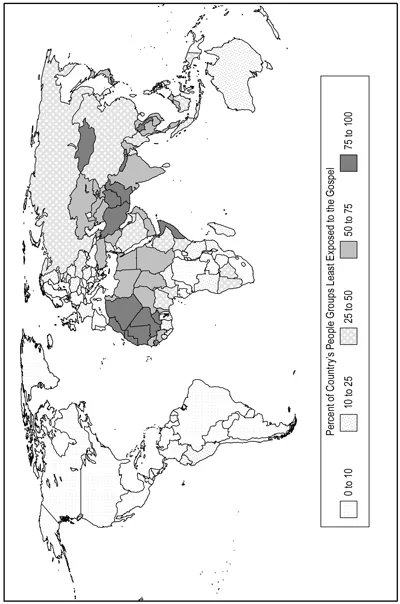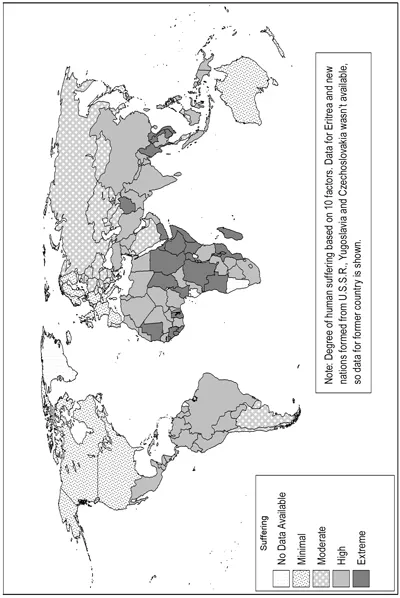![]()
Part One
Principles of Great Commission Companies
![]()
1
The Good News About Globalization
But thanks be to God, who always leads us in triumphal procession in Christ and through us spreads everywhere the fragrance of the knowledge of him.
2 CORINTHIANS 2:14
integrate (ĭn'tĭ-grāt') v. 1. To make into a whole by bringing all parts together. 2. To end the segregation of and bring into common and equal membership in society.
Somewhere in Central Asia, an employee is assaulted by a gang of thugs, and when the employee’s boss learns of it, he uses the opportunity to disciple the new believer and help him understand what Christ meant when he said, “Love your enemies.” By the end of the meeting they are in a quiet room asking God to bless the young men who attacked him. At another company in Thailand, a young woman who describes herself as “not smart” was accustomed to being severely punished by her bosses for minor mistakes. Over time she learned to avoid making decisions on her own or taking any initiative. When she made a mistake at her new job, she expected to be harshly treated or even fired. Instead, her manager, someone who claimed to be a follower of Jesus, was kind to her, forgave her and helped her learn from her mistake. She was astounded, and before long was committed to following Jesus herself. In South Korea, a Christian business owner believed God wanted him to move his company to China, and five years later a quarter of his two thousand employees are following Christ. Many have taken advantage of the company-sponsored classes in computers, English, Korean, nutrition, music and dance, and some are even receiving corporate scholarships for formal pastoral training.
These are just a few examples of the increasing role businesses and the professionals who manage them are playing in missions. The specific examples were taken from companies located in Central, East and Southeast Asia, but these same things are happening everywhere, thanks in part to the phenomenon commonly called globalization. When most people talk about globalization, they are referring to the reduction in the political, social and economic barriers that once kept countries and cultures largely separate. But there is another barrier falling—a theological one—that is having a profound effect on how the church understands and fulfills its purpose. This barrier is the unwritten “spiritual-vocational hierarchy” that has governed the way many people think about their role in Christian ministry. This hierarchy treats some vocations, specifically those higher up on the pyramid in figure 1.1, as more God-pleasing and honorable than others. According to this theology, those who are the most sincere about their commitment to Christ will get special vocational training, switch careers and become professional Christian workers supported by the donations of other Christians. The implication is that spiritual growth naturally leads maturing Christians to exchange their careers at the bottom end of the pyramid for those closer to the peak.
Figure 1.1. Spiritual-vocational hierarchy. Adapted from R. Paul Stevens, The Other Six Days: Vocation, Work and Ministry in Biblical Perspective (Grand Rapids: Eerdmans, 1999).
The only problem with this view is that there is no biblical support for it. Professional Christian workers certainly have their place, and God does occasionally prompt people to switch vocations, but there is nothing vocation-specific about our call to be full-time bearers of good news. As theologian R. Paul Stevens wrote in his book The Other Six Days: Vocation, Work, and Ministry in Biblical Perspective, “Mission is the intended occupation and preoccupation of the whole people of God, not merely a few chosen representative or designated missionaries.”[1] Our individual callings and gifts may differ, but mission is nevertheless the central purpose of the entire body of Christ. The perceived distinction between “good” and “better” vocations has served only to undermine the effectiveness of the church because many Christians simply resign themselves to second-class status, or worse, become detached from any involvement in ministry. Using an analogy of Ed Silvoso of Harvest Evangelism, the end result is something that resembles a World Cup soccer match that has gone into overtime:
A handful of players, all in desperate need of rest, run all over the field while hundreds of thousands of spectators . . . watch from comfortable seats. The players are the ministers who exert most of the energy, and the spectators represent the laypeople whose participation is limited to a secondary role, mainly making the whole enterprise financially feasible.[2]
This book is for the countless Christian men and women in business who want to do more than watch the game of missions. They want to do more than dole out money to make the game financially viable; they want to be on the playing field. They have served on church committees, they have reflected Christ in their workplaces, they have participated in short-term missions trips, but the unmistakable message they continue to receive is that anything more requires a career change. This is a tough pill to swallow for people who are creative and resourceful by nature, and who quite frankly enjoy their business career. The purpose of this book is to show how it is not only possible today but also necessary for business professionals—and companies owned by Christians—to become more actively involved in missions.
Our main focus will be on companies that are bringing the healing message of the gospel to the least developed and least evangelized parts of the world. We recognize, of course, that the Great Commission applies at home as well as abroad. Matthew 28:18-20 implies this, and Christ’s final words to his disciples in Acts 1:8 remove any doubt. However, it is also true that almost 29 percent of the world’s population—over two billion people—still have no idea who Jesus Christ is or why his death and resurrection matter.[3] Furthermore, they will likely never encounter a single follower of Jesus, even though in some cases there is a substantial Christian population surrounding them. As we can see in figure 1.2, almost all of these so-called unreached people live in the Eastern hemisphere, with the heaviest concentrations located in Asia, the Middle East and North Africa.
Figure 1.2. The world’s most unreached people. Source: Global Mapping International. Used with permission.
The reason for these pockets of unreached people is that the gospel tends to stay within cultures and cross linguistic or cultural barriers only when a deliberate effort is made. The barriers are even more significant if reinforced by centuries of conflict and prejudice. For example, Palestinian Christians are unlikely to have much success evangelizing their Israeli neighbors, and vice versa. The same is true of a Turkish Christian trying to communicate the gospel to one of the seven distinct Kurdish people groups. All over the world, invisible walls separate people into some 16,500 “people groups” and inhibit the gospel’s spread. In India alone there is estimated to be more than 2,500 distinct people groups. While an estimated ninety million Indians classify themselves as Christian, they represent only 8.1 percent of the population, and the vast majority of the people groups have never heard the gospel.[4] The same is true in China, Pakistan, Indonesia and other countries that have substantial Christian populations but are still considered largely unreached.
Adding insult to injury, roughly 90 percent of the world’s poorest and most suffering people live in these same countries. (See figure 1.3.) In such parts of the world, poverty is defined not by whether a person has a home with heat, electricity and indoor plumbing, but simply by the person’s ability to remain alive from one day to the next. According to the World Bank, almost a quarter of the world’s population struggles on one dollar per day or less, and nearly half of the world survives on less than two dollars per day. These countries are also plagued by a long list of other problems that are closely related to poverty, such as a lower average life expectancy, higher infant mortality rates, lower literacy rates and so on.
Large parts of the world are suffering, unreached and off-limits to professional missionaries. Frankly, most of these countries are not interested in allowing people into the country for the sole purpose of converting others to their religion. As a consequence, the missionary visa is quickly becoming a relic of colonialism, and would-be missionaries must find other ways to gain entry into those countries. Some gain access by providing humanitarian services, but these tend to reach only the most displaced and desperate segments of society. Others go as students or as tourists, which also have limited reach. Business, on the other hand, has, as C. Neal Johnson puts it, “a remarkable capacity to touch virtually every person on the face of this planet.”[5] Radio and television ministries have a similar potential but are limited in their ability to stimulate economies or meet physical needs. Moreover, only flesh-and-blood people can build relationships and model the gospel in real-life settings. Business provides such a context for long-term holistic outreach.
This is not a book about microenterprise development. As valid as helping poor people start their own small businesses may be, what we are describing is a fundamentally different approach to economic and spiritual development. This approach borrows a page from something that most governments and economists have recognized for a long time: multinational corporations—properly motivated—can greatly assist the development process by upgrading a country’s economic capabilities, contributing to its integration into the global economy and fighting against poverty and other socioeconomic problems. (Chapter three will identify the factors that enhance a company’s development potential.)
Figure 1.3. Human suffering index. Source: Global Mapping International. Used with permission.
Such companies can also have a spiritual impact that many missionaries envy for the simple reason that people spend so much more time at work than they do in traditional ministry contexts. Evangelism and discipleship can be integrated into natural workday situations rather than forced to compete with a host of after-work alternatives. Meetings with customers and suppliers become God-designed, Spirit-abetted opportunities to build relationships and have a meaningful influence in people’s lives. Lunchrooms double as places where prayer, Bible study and worship can take place. Corporate profits can be used to support other ministry outside the company. The companies mentioned at the beginning of the chapter are only a few examples of this. We have found that, regardless of whether they are managed by Western or non-Western “majority world” Christians, large companies a...






